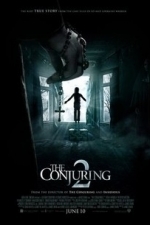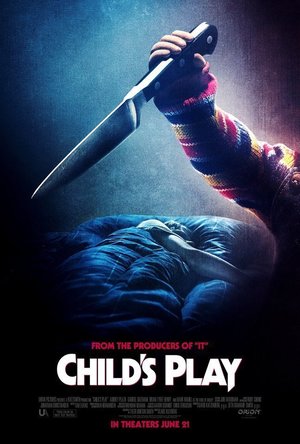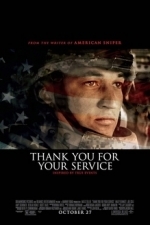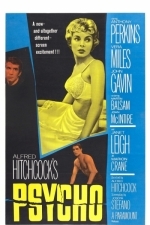Search
Search results
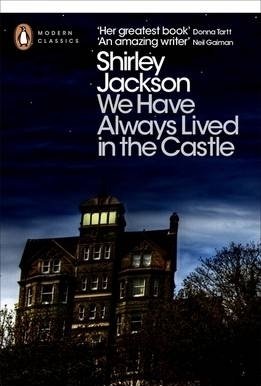
We Have Always Lived in the Castle
Book
Shirley Jackson's masterpiece: the deliciously dark and funny story of Merricat, tomboy teenager,...
Andrew Kennedy (199 KP) rated The Conjuring 2 (2016) in Movies
Jun 6, 2021
Contains spoilers, click to show
The Conjuring 2 is based on the events of The Enfield poltergeist from 1977 the film however starts with the Warren's involvement with The Amityville incident it is during this that Lorraine has a vision of Ed dying.
In England a single mother of four is struggling to make ends meets for her family and then one of the daughters,Janet, starts to experience waking downstairs. It isn't long till it is established its a haunting. Various experts and skeptics alike decend on to the family home till during a TV interview Janet speaks as that of former home resident Bill Watkins.
This eventually brings in the church who contact the Warren's for them to assess whether its a hoax or not.
It is definitely presented as real. Lorraine is still troubled by her premonition of Eds demise but they seem to bond with the family.
Plenty of twists and scares and huge amount of atmosphere make this, dare I say it, a more enjoyable watch then the first Conjuring.
Of course this is based on a real life situation and all the players who were involved are represented in the film. However, the Warren's involvement was nowhere near as much as portrayed here (claims that no one even knew who Ed Warren was). In the end some believe its Britain's Amityville or a clever hoax by some teen girls, the film doesn't try to get into though there is a scene which eludes to the fact it could have been a hoax.
Patrick Wilson and Vera Farmiga are back as the Warren's and are both very good in there roles. It is however young Madison Wolfe as Janet who steals the show from confused, scared little girl to snarling demon. The TV interview scene she portrays the point where Janet is possessed superbly.
Special mention to Simon Mcburney for his portrayal of Maurice Grossae.
James Wan is a man who knows how to
In the end I give The Conjuring 2 top marks. A film I enjoyed immensely and actually preferred this to the original.
In England a single mother of four is struggling to make ends meets for her family and then one of the daughters,Janet, starts to experience waking downstairs. It isn't long till it is established its a haunting. Various experts and skeptics alike decend on to the family home till during a TV interview Janet speaks as that of former home resident Bill Watkins.
This eventually brings in the church who contact the Warren's for them to assess whether its a hoax or not.
It is definitely presented as real. Lorraine is still troubled by her premonition of Eds demise but they seem to bond with the family.
Plenty of twists and scares and huge amount of atmosphere make this, dare I say it, a more enjoyable watch then the first Conjuring.
Of course this is based on a real life situation and all the players who were involved are represented in the film. However, the Warren's involvement was nowhere near as much as portrayed here (claims that no one even knew who Ed Warren was). In the end some believe its Britain's Amityville or a clever hoax by some teen girls, the film doesn't try to get into though there is a scene which eludes to the fact it could have been a hoax.
Patrick Wilson and Vera Farmiga are back as the Warren's and are both very good in there roles. It is however young Madison Wolfe as Janet who steals the show from confused, scared little girl to snarling demon. The TV interview scene she portrays the point where Janet is possessed superbly.
Special mention to Simon Mcburney for his portrayal of Maurice Grossae.
James Wan is a man who knows how to
In the end I give The Conjuring 2 top marks. A film I enjoyed immensely and actually preferred this to the original.
Kelly Knows (95 KP) rated Child's Play (2019) in Movies
Jun 25, 2019
New Chucky Is My Favorite Chucky
I am a reborn Chucky fan after the wonderful 2019 reimagining that is Child's Play. It is not easy to follow a long-standing series with a history of both slasher success, and campy catastrophe. Child's Play is a fresh new story that puts a much-needed spin on a franchise that frankly had been run into the ground. At its heart, this movie is exactly what it is supposed to be, a thrilling tale of a killer doll run amok. Though I imagine some diehard fans are inevitably going to be disappointed, I call this a resounding win. I wasn't a fan of the Chucky design at first, but it won me over later during a hilarious teaching moment between Andy and his pal in the first act. The lighting and camera work are solid, with a haunting, playful score that draws out the tension like a blade. Parents be warned, there is plenty of brutality, and no shying from gore. Even jaded millennial kids should wait to see this one. The story is a fantastic satire of all things electronically assisted, and paints a believable portrait with bloody overtones. The thrilling premise really shines due to the superior talents of the cast and crew. Aubrey Plaza brings weight to a character that is almost unceremoniously sidelined for most of the movie. The real celebration is Gabriel Bateman's performance as Andy Barclay. The slower paced moments settle a pall of tension over events as you share in Andy's isolation and later persecution. The supporting cast won me over entirely. Even the cannon fodder characters are awesome, with a pleasant dose of likability that gives them depth, with varying levels of unpleasantness that will have you tongue in cheek rooting for Chucky at times. Good stories are enjoyable. Check. Great stories get us thinking. Double check. When top-tier tech meets malicious malfunction, Chucky will have us all asking ourselves... "Are you broken like me?
Gareth von Kallenbach (980 KP) rated Thank You for Your Service (2017) in Movies
Jul 11, 2019
The words “Thank you for your service” have gone from a meaningful statement of gratitude to an empty platitude. As a veteran, I cringe when someone says it to me when buying groceries, at the gym, or at an event where there is a casual reference to veterans. The film Thank You For Your Service examines the lives of those affected by the war directly and indirectly. In the movie, Miles Teller (Whiplash, War Dogs, Fantastic Four) plays Staff Sergeant Schumann, an Iraq War vet who is returning to his family and hoping to return to some sense of normalcy. Unfortunately, he and his friends discover that the war and the horrors that they witnessed cannot be escaped.
Thank You For Your Service is able to address an aspect of war that many films overlook; how the men and women who are deployed changed by their experiences. Additionally, it tackles the questions of how their families cope with the changes to them, how they go about living a normal existence, and how people understand how they are harmed by war without any visible injuries?
The film is a testament to the men and women suffering from Post Traumatic Stress Disorder (PTSD). It doesn’t sugar-coat or trivialize their experiences. The emotions are raw. The visual representation of their daily terror is present. With depth, the film shows audiences who may be unfamiliar with veterans or those suffering from PTSD what the world really looks like to them and how they struggle with just existing.
The film takes the statement of “Thank you for your service” and gives it greater meaning in able to connect the problems inherent in the military, healthcare system, and how we as a society view mental health. The film allows for an authentic examination of what servicemembers deal with in their return home from war. It becomes apparent that they themselves may be able to leave the battle, but the battle stays with them, tormenting and haunting them as each day passes. The war they face never ceases. Thank You For Your Service will hopefully help foster substantive discussions about what many men and women deal with in their return from the horrors of war.
Thank You For Your Service is able to address an aspect of war that many films overlook; how the men and women who are deployed changed by their experiences. Additionally, it tackles the questions of how their families cope with the changes to them, how they go about living a normal existence, and how people understand how they are harmed by war without any visible injuries?
The film is a testament to the men and women suffering from Post Traumatic Stress Disorder (PTSD). It doesn’t sugar-coat or trivialize their experiences. The emotions are raw. The visual representation of their daily terror is present. With depth, the film shows audiences who may be unfamiliar with veterans or those suffering from PTSD what the world really looks like to them and how they struggle with just existing.
The film takes the statement of “Thank you for your service” and gives it greater meaning in able to connect the problems inherent in the military, healthcare system, and how we as a society view mental health. The film allows for an authentic examination of what servicemembers deal with in their return home from war. It becomes apparent that they themselves may be able to leave the battle, but the battle stays with them, tormenting and haunting them as each day passes. The war they face never ceases. Thank You For Your Service will hopefully help foster substantive discussions about what many men and women deal with in their return from the horrors of war.
Andy K (10823 KP) rated Psycho (1960) in Movies
Sep 30, 2019
Most Hollywood scholars and film critics agree Vertigo is the ultimate Hitchcock masterpiece with Psycho, North By Northwest or Rear Window rounding out the top 4. Although I would give each a 10 out of 10, I would say Psycho is probably my all time favorite.
Maybe you could say Vertigo is a better technical film or it uses camera, lighting, sets and scenery better, but Psycho has all of that as well and then some. I remember reading somewhere a list of movies where mid way through the film the plot was hijacked in a completely different direction than it had been going (for movies like From Dusk Till Dawn and True Lies), but Psycho was not listed.
I was extremely surprised in that by 1960, how many filmmakers would dare kill off their only main character and the only one the audience cares about partially through and leave the audience gasping as what was to happen next? I wish I had been sitting in a darkened theatre in 1960 to see just that. Working at movie theatres for years, I have had my share of watching crowd reaction both in laughter and in fear, and I can see how movie makers enjoy doing this themselves for their own films.
Great movies keep you coming back even though you are completely familiar with every detail already, but still come back to rewatch anyways.
I have to assume Anthony Perkins did too good of a job as Norman Bates to have any casting directors use him for different roles. He reprised Norman, several times in the 80s and 90s, and also had roles in other films like The Black Hole and Murder on the Orient Express, but no one really remembers him for anything other than Psycho. He was just that great.
I absolutely love the Bernard Herrmann score, especially over the haunting opening credit sequence. One of the best of all time. Have to mention Janet Leigh also won an Oscar for Best Supporting Actress. She was memorable and marvelous as well.
And Hitch never won Best Director.
Maybe you could say Vertigo is a better technical film or it uses camera, lighting, sets and scenery better, but Psycho has all of that as well and then some. I remember reading somewhere a list of movies where mid way through the film the plot was hijacked in a completely different direction than it had been going (for movies like From Dusk Till Dawn and True Lies), but Psycho was not listed.
I was extremely surprised in that by 1960, how many filmmakers would dare kill off their only main character and the only one the audience cares about partially through and leave the audience gasping as what was to happen next? I wish I had been sitting in a darkened theatre in 1960 to see just that. Working at movie theatres for years, I have had my share of watching crowd reaction both in laughter and in fear, and I can see how movie makers enjoy doing this themselves for their own films.
Great movies keep you coming back even though you are completely familiar with every detail already, but still come back to rewatch anyways.
I have to assume Anthony Perkins did too good of a job as Norman Bates to have any casting directors use him for different roles. He reprised Norman, several times in the 80s and 90s, and also had roles in other films like The Black Hole and Murder on the Orient Express, but no one really remembers him for anything other than Psycho. He was just that great.
I absolutely love the Bernard Herrmann score, especially over the haunting opening credit sequence. One of the best of all time. Have to mention Janet Leigh also won an Oscar for Best Supporting Actress. She was memorable and marvelous as well.
And Hitch never won Best Director.

Fatherland by Kele Okereke
Album Watch
On his third solo effort, Bloc Party frontman Kele Okereke made a sharp turn away from the...
rock pop

SpiderBeetleBee by Bill MacKay
Album Watch
Drag City presents the second volume of Bill MacKay and Ryley Walker's inspired collaboration. It's...
folk rock
